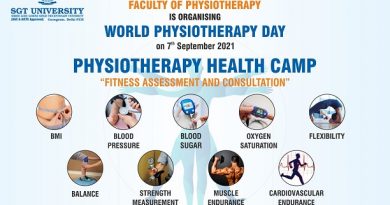Understanding Depression and its Treatment
By Dr. Ved Mahla
Depression is not just being sad. It has a distinct quality of its own which can perhaps be felt or described by someone who suffers from it. Feeling sad sometimes is a normal human emotion, say for example after failing in examination, but it’s not depression which we understand clinically.
Depression is best understood as a medical disorder of the brain in the same way as we understand chronic medical disorders like Hypertension, DM, Heart Diseases, Asthma, Allergies and so on. The other way to understand it is that it’s a life style disorder like above mentioned chronic medical diseases. It has similar pathophysiology as these diseases and similar treatment methods.
What causes Depression?
- Depression can be caused by Genetic factors
- It can be caused by a disturbed Brain neurobiology
- It can have psychosocial stressors and history of Abuse as precipitants
- It can run in families.
But one thing must be understood by one and all that psychosocial stressors will cause Depression only in someone who is predisposed, genetically programmed or destined to have depression. Psychosocial stressors by themselves won’t result into depression in everyone.
Conversely, one doesn’t need psychosocial stressors to suffer from depression. Depression cuts across classes, education levels, gender and socioeconomic levels of individuals who suffer from it. Although, females outnumber males in a ratio of 3 to one to suffer from it but that number may be a statistical artefact if all things like substance abuse etc. are considered.
Another important aspect which needs mentioning here regarding Depression or for that matter regarding psychiatric illnesses in general is this: that people who are more educated and of higher socioeconomic strata have poorer knowledge of and less willing to seek treatment for depression. And consequently, more likely to die by suicide when suffering from Depression. They may not seek treatment for a variety of reasons but the most common one is shame, stigma or taboo about seeking treatment for a psychiatric disorder, Depression being just one. Suicide is the commonest consequence for not seeking timely help for Depression, other than a colossal loss of productivity and quality of life years lost. Infact, even for those who are seeking treatment for Depression, there is 15 % chance that they would end up committing suicide.
Diagnosing Depression
According to the conventional Diagnostic Systems like ICD or DSM (5), Depression is diagnosed as a combination of signs and symptoms or Criteria of certain number of Primary or Secondary symptoms present in a patient, persisting for a minimum period of 15 days. But for simplicity I will divide these Signs and Symptoms as Usual and Unusual Symptoms of Depression:
Usual Symptoms of Depression
- Low or depressed or down in the dump mood
- Pervasive loss of interest in the usual activities
- Low energy, lethargy, easy fatigability or inability to initiate a work or to complete it.
- Procrastination
- Poor sleep, especially difficulty in falling asleep or early morning insomnia.
- Excessive worrying
- Hopelessness, helplessness
- Anxiety
- Suicidal thoughts, ideation or gestures.
- Loss or impaired libido
- Increase or decrease in appetite
- Loss of weight or gaining weight
- Tearfulness
- Falling grades in school or decreased productivity at work
Unusual Signs and Symptoms of Depression
- Shopping sprees
- Binge eating
- Getting drunk
- Gambling and other risk taking behaviours
- Self-harming behaviours
These symptoms can be assessed and evaluated by clinical observations or using self-rating or observer rated Scales like Hamilton Depression Rating Scale.
Treating Depression
Depression can be treated successfully and completely by either Non Pharmacological Method or Pharmacological and other Somatic treatments or a combination of both depending on the
Severity, Presentations, Age, Treatment goals and Outcomes.
Non Pharmacological Treatment Methods
- Exercises or physical activities
- Dietary considerations
- Developing new hobbies or reinforcing old ones
- Keeping pets
- Enhancing social interactions and networking
- Dealing with loneliness especially in elderly
Specialised Non Pharmacological Therapies
1.Interpersonal psychotherapy
2.Cognitive Behaviour Therapy
3.Motivational Enhancement Therapy
Pharmacological Therapies
Antidepressants such as SSRIs, SNRIs etc.
Still a large number that is about 30 to 40 percent patients won’t respond to any of the antidepressants.
If everything else fails or patient is highly suicidal or having inanition
Modified ECT which is highly effective, safe and can be lifesaving, notwithstanding the controversy surrounding its use and n numbers of biases against its use for n numbers of prejudices.
Finally, a word about Suicide and Depression.
A large majority of patients who are not treated for their depression end up committing suicide Almost all suicides which we hear or read in media are generally a consequence of untreated Depression or some other psychiatric ailment.
So, the need of the hour is to open up, talk about mental health issues, especially
Depression; seek timely professional help and live a productive, meaningful life realizing one’s full potential as a human being.
(The author is Professor and Head of Psychiatry Department in the Faculty of Medicine and Health Sciences, SGT University, Gurugram. He can be reached at drvedpal.fmhs@sgtuniversity.org; drvpmahla@gmail.com )



